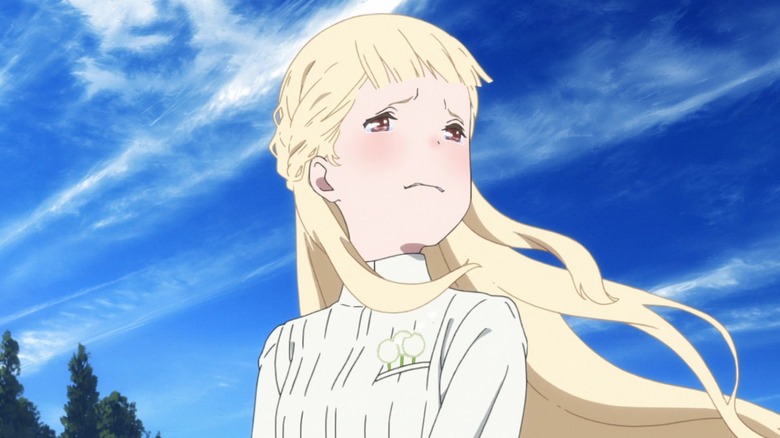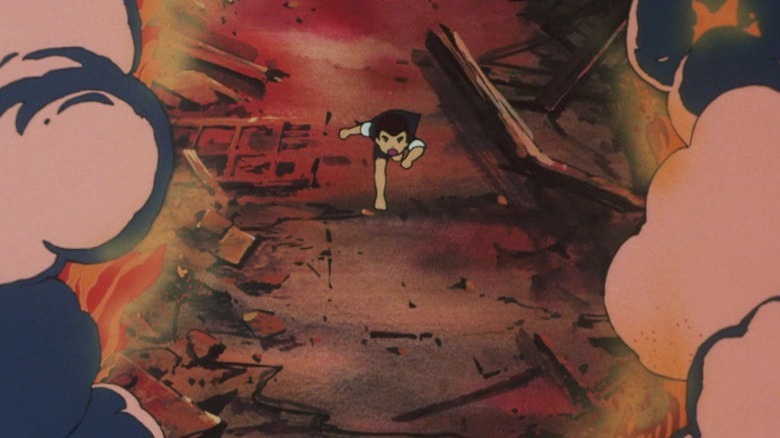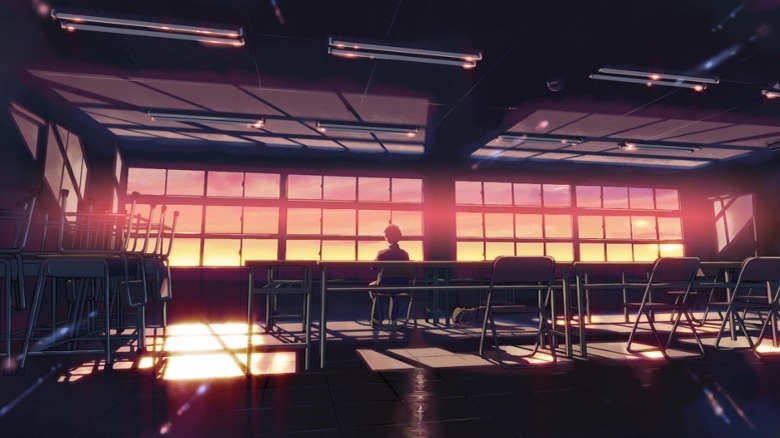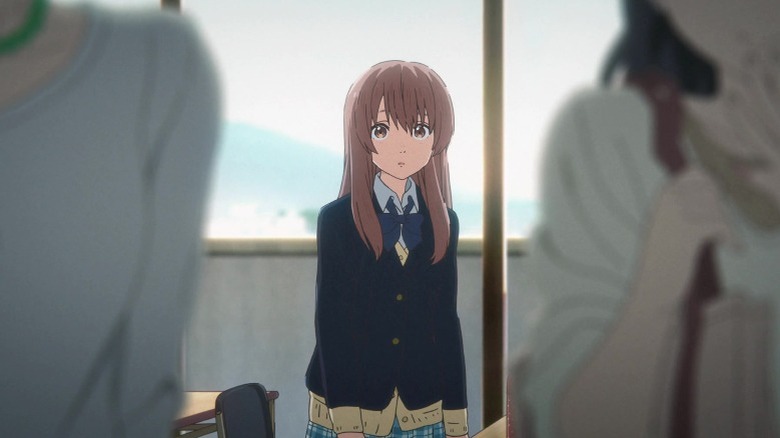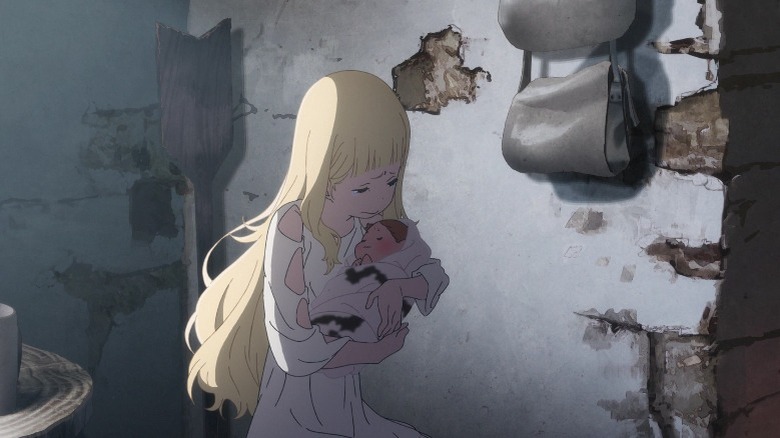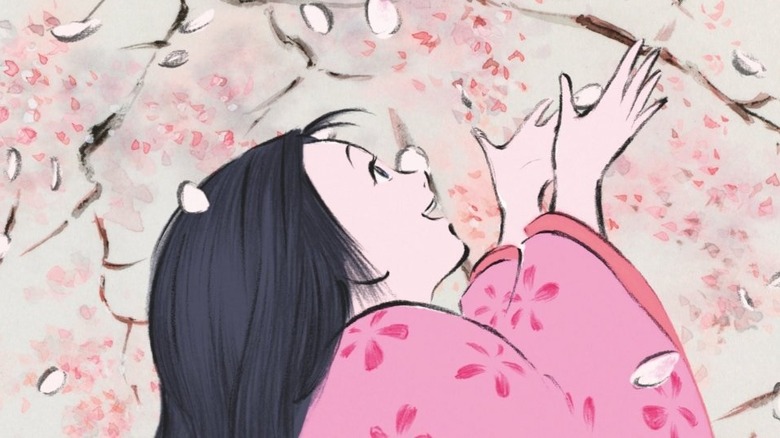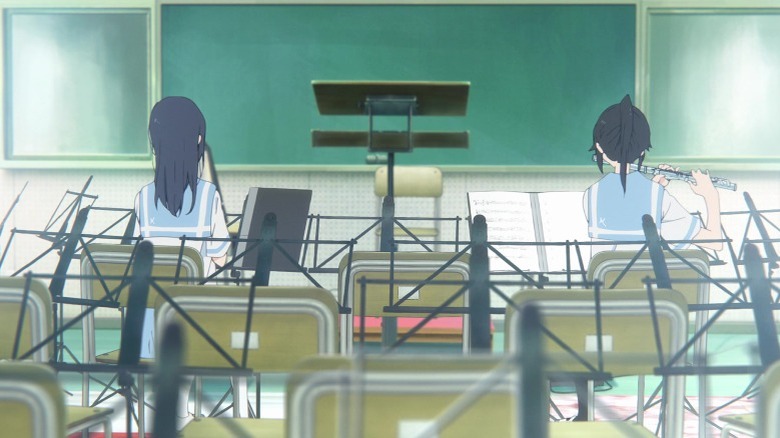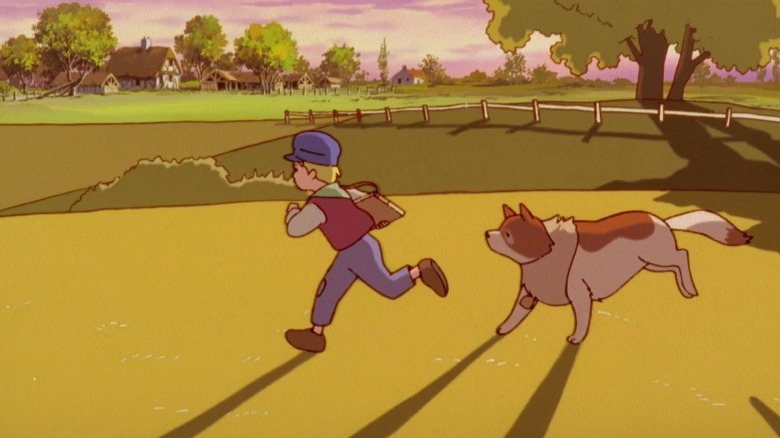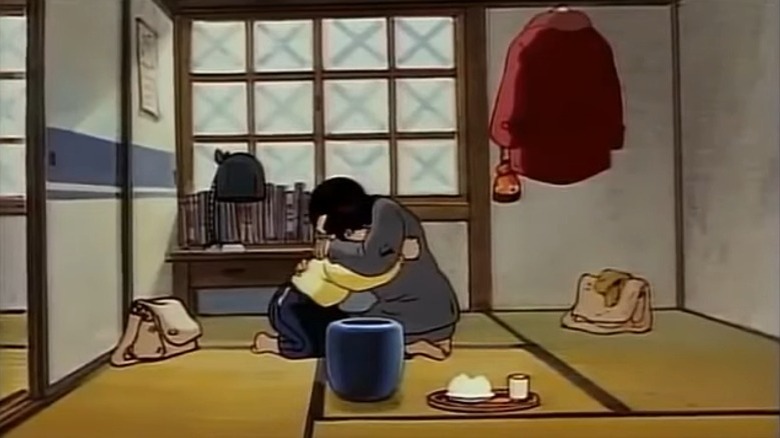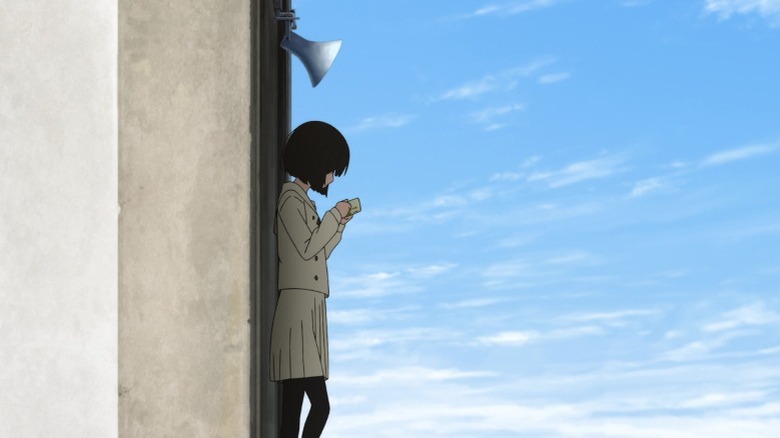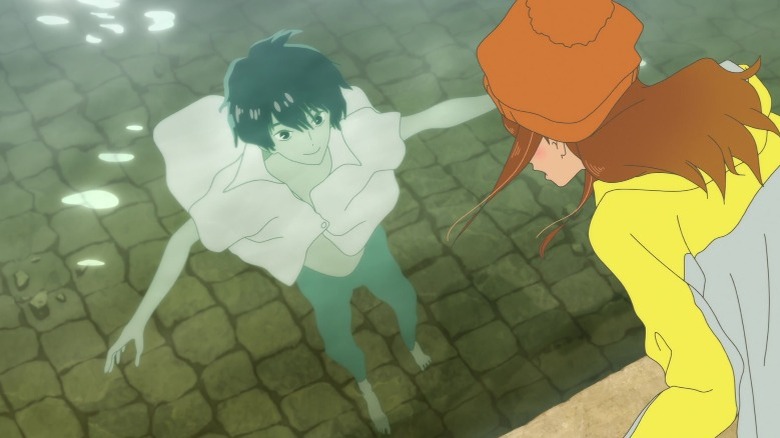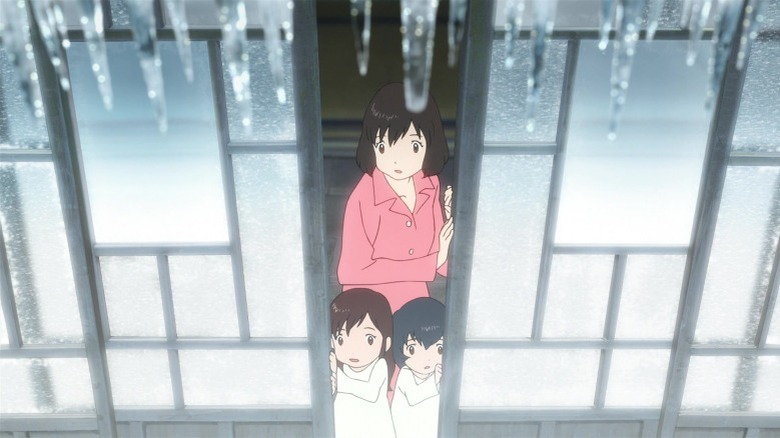Sad Anime Movies To Watch When You Need To Cry Your Eyes Out
Anime can be a spectacularly potent medium when it comes to working the tear ducts. The artists and storytellers in Japan's animation industry have spent decades refining their craft, to the point of understanding exactly what makes viewers tick and how to hit them square in the heart. Here, we've compiled a list of 11 great Japanese animated films that were masterfully designed to overwhelm you with emotion. They range from unflinching war dramas and troubled romances to heartbreaking movies about time and transience.
Although some of these films are iconic and widely-known among anime aficionados, we've opted to avoid the obvious picks — you won't see Isao Takahata's "Grave of the Fireflies" or Makoto Shinkai's "Your Name" here, tear-jerking as they may be. What you will see are different films by Takahata and Shinkai, as well as efforts from several other animation masters who have perfected the art of making you weep.
So, if you're looking for that specific kind of intense cry that only a good anime can provide, any movie on this list should do the trick. However, be warned: Some of them have the potential to leave you upset for days.
Barefoot Gen (1983)
The atomic bombings of Hiroshima and Nagasaki were so nightmarish and horrifying that Western audiences may be more used to seeing them depicted obliquely. Even in Japan itself, it took some time before filmmakers were ready to depict the bombings themselves directly. When they did, the resulting films were among the most harrowing ever made — and there's arguably none more harrowing than Mori Masaki's "Barefoot Gen."
Based on a manga series by Keiji Nakazawa and animated by Madhouse (the studio behind some of the best anime movies of all time), "Barefoot Gen" doesn't cut corners in its storytelling. It follows a young boy named Gen Nakaoka (Issei Miyazaki) as he endures the Hiroshima bombing, survives it by chance, sees most of his family burn to death, and then struggles to carry his pregnant mother (Yoshie Shimamura) and, later, his newborn sister through the bombing's punishing aftermath.
The story is told through expressive, almost cute animation, accentuating the incongruence between Gen's point of view and the horrors he's forced to grow up through. It's one of the darkest, most emotionally draining films ever made, all the more for keeping things so real; Nakazawa (who died in 2012) was a Hiroshima survivor, and he largely based the story on his own experiences. Hard as it may be to watch, "Barefoot Gen" is an essential masterpiece about endurance and courage that gives us an unfiltered view of the deadly destruction.
5 Centimeters per Second (2007)
The second feature film directed by anime luminary Makoto Shinkai, "5 Centimeters per Second" is, much like several of Shinkai's other films, a romance. And, also like his other work, it's a romance drenched in melancholy, longing, and regret. The story is structured into three acts, each following Takaki Tōno (Kenji Mizuhashi) at a different age as he experiences the ups and downs of love and infatuation, balancing them with the demands of growing up and facing adult life.
As ever with Shinkai, the film's animation — supplied by CoMix Wave here — is nothing short of breathtaking, with environments and landscapes and lighting schemes so lush that they make the most beautiful animated films look comparatively plain. What really sets "5 Centimeters per Second" apart as an emotional powerhouse is that, if some of Shinkai's movies have a tendency to short-change the visual beauty with maudlin storytelling, this particular film keeps the feelings at a careful boil, folding them into a narrative that feels sincere and convincing in its weepiness.
It's essentially a film about how unkind the contemporary world is to love and to those who seek it, with the tears flowing less from grand tragedies or twists and more from the identification to be found in Shinkai's depiction of loneliness and casual heartbreak. And, what's more, some of the shots are gut punches by themselves, teeming with enough visual poetry to speak directly to the soul without any need for words. It's one of the best romantic anime movies and it's bound to leave you with wet eyes.
A Silent Voice (2016)
Adapted by Reiko Yoshida from the eponymous manga by Yoshitoki Ōima and directed by the brilliant Naoko Yamada, "A Silent Voice" is a rare and invaluable example of an anime film entirely written and directed by women, but its value is far from merely representational. There's a reason why Yamada's film became one of the most popular and acclaimed Japanese animated films of the 2010s: Not only is the Kyoto Animation-supplied imagery lush and poetic in the way the best anime can be, but the storytelling reaches a level of complexity and emotional richness that very few films, animated or otherwise, can match.
Following a large cast of vividly-rendered, three-dimensional young characters, this dramatic anime hidden gem is primarily centered around Shōya Ishida (Miyu Irino) and Shōko Nishimiya (Saori Hayami). Shōya is a high schooler who used to be a popular kid in elementary school. He took his bullying of Shōko, a deaf transfer student, so overboard that the other kids started excluding and ostracizing him. Now lonely and depressed, Shōya becomes determined to make amends with Shōko and redeem himself — without even really knowing if such a thing is still possible.
That intensely thorny setup gets explored to its fullest, with each new scene serving up numerous insights on regret, shame, guilt, forgiveness, and the nature of human relationships. It's not an overtly tragic or melodramatic film, but just you try watching it without your stomach getting tied up in knots. Trust us: It's best to keep some tissues handy.
Maquia: When the Promised Flower Blooms (2018)
Few films in recent memory pull off such an epic temporal sweep as "Maquia: When the Promised Flower Blooms," the directorial debut of prolific anime writer Mari Okada. An original high fantasy drama penned by Okada herself and animated by P.A. Works, the film makes masterful use of the subject of immortality to confront the hard reality of mortality. It addresses loneliness and grief in an extremely direct way through the story of Maquia (Manaka Iwami) and her adopted son Ariel (Miyu Irino).
In the film's world, there is a race of humanoid beings called the Iorph, who stop aging at 14 years old and can have natural lifespans of hundreds of years. The Iorph live isolated in a settlement far away from humankind's reach. Protagonist Maquia lives with the irony of being surrounded by long lives and near-immortality while having lost her parents at a young age; her unusually personal understanding of death for an Iorph gets even starker when the neighboring kingdom of Mezarte invades the settlement with mighty dragons known as the Renato and kill off most of the population.
Maquia survives, having been carried off to the human world by a raving Renato. She adopts an orphaned newborn who she goes on to raise, learning about humans and their finitude through him. It's a setup that's ripe for tears, and the film certainly delivers: Okada mercilessly calibrates the story for maximum emotional destruction. A more accurate title would be "Maquia: When the Promised Tears Flow."
The Tale of the Princess Kaguya (2013)
The late anime legend Isao Takahata is not as well known as fellow Studio Ghibli founder Hayao Miyazaki, but he's behind some of Ghibli's best ever movies. For those with a fondness for grand drama and emotional rawness, Takahata's films often pack more of a wallop. "Grave of the Fireflies" is universally recognized as a grueling watch — it's a strong contender for saddest film of all time, animated or not — but Takahata didn't stop there. He kept making emotional bombshells to the very end of his career, as attested by his final film (and his magnum opus, in our opinion), the towering masterpiece that is "The Tale of the Princess Kaguya."
A stylistic departure for Ghibli, "The Tale of the Princess Kaguya" boasts a dazzling aesthetic, with delicate linework and watercolor backgrounds used to pitch the folktale plot at maximum visual expressiveness. Adapted from the 10th century story "The Tale of the Bamboo Cutter," it's a heartrending, melodramatic epic set over the course of decades. It follows a girl (Aki Asakura) who is found inside a shoot by a bamboo cutter (Takeo Chii) and his wife (Nobuko Miyamoto), then raised as a beloved princess with many suitors she doesn't want to marry. Over time, Kaguya learns the truth about her origins and her fate, leading the story toward a tragic denouement that will really knock the wind out of your sails.
Liz and the Blue Bird (2018)
"A Silent Voice" is not the only instance of Naoko Yamada using high school as the backdrop for a supremely touching film. Two years later, she once again teamed up with writer Reiko Yoshida and the artists at Kyoto Animation to make "Liz and the Blue Bird," a spin-off of the anime series "Sound! Euphonium." Despite the connection to "Sound! Euphonium," "Liz and the Blue Bird" can be fully enjoyed by those unfamiliar with the source material — if you don't mind getting a bit teary, that is.
Split between a grounded, realistic teen drama set entirely indoors and a fantasy story-within-a-story, "Liz and the Blue Bird" is centered around Mizore Yoroizuka (Atsumi Tanezaki) and Nozomi Kasaki (Nao Tōyama), two high school friends who share the kind of closeness that can feel all-consuming when you're a teen. As they rehearse a complex piece for a presentation with their school's wind band (Mizore is an oboist and Nozomi is a flutist), they begin to realize that the (fictional) German fairy tale the piece is based on mirrors their own experience of loving each other deeply yet realizing that life is about to pull them apart.
"Liz and the Blue Bird" has been interpreted by some as a friendship story and by others as a romance (Anime Feminist said that it "feels like a coming-of-age lesbian indie film that would win some awards at Sundance"). Either way, it's an extremely engrossing film that will no doubt leave you with a lump in your throat. Yamada uses a masterfully-orchestrated blend of music and insular, reiterative visuals to bring out all the nuances, joys, and simmering conflicts of Mizore and Nozomi's connection.
A Dog of Flanders (1997)
There are few ploys for tears in filmmaking more dependable than a good boy-and-his-dog story, and, as those films go, "A Dog of Flanders" is one of the finest. Adapted from the 1975 anime series of the same name, which was based on an English novel from 1872, the film version of "A Dog of Flanders" is among the most notable works of the Nippon Animation studio. Much like the series, it was directed by Yoshio Kuroda, and it provides an opportunity to see a seasoned anime director revisiting an old story through a more mature and tempered perspective — but without skimping on its tear-jerking potential.
The original novel deals with a poor orphan boy who dreams of becoming a painter in 19th-century Flanders, Belgium, and Kuroda's film visualizes Nello's (Makoto Tsumura) story through animation evoking oil paintings. Aesthetically interesting as the film may be, though, the real attraction is the irresistible story of Nello's friendship with Patrash, a working dog neglected and abandoned by his former owner.
Watching Nello nurse Patrash back to health and develop a close bond with him is greatly moving by itself, but the film takes a step beyond most "dog movies" and also weaves complexity into the relationship, showing Nello as a loving but imperfect tutor whose own struggles sometimes make it difficult for him to repay Patrash's loyalty properly. Honest, poignant, and life-affirming, it's the kind of movie that seems to almost challenge viewers not to cry.
Kayoko's Diary (1991)
Released three years after "Grave of the Fireflies," "Kayoko's Diary" — also sometimes known as "Who's Left Behind?" — could be considered a sibling film to the 1988 Isao Takahata classic, also exploring the reality of World War II on the ground through the innocent perspective of children. Yet, perhaps due to its proximity to the hugely famous Studio Ghibli film, "Kayoko's Diary," a Mushi Production title, remains relatively obscure outside of Japan, with few Western viewers having seen Seiji Arihara's anti-war vision. That's a real shame, because Arihara's movie is a powerful and persuasive treatise on the sheer inhumanity of war.
Unlike "Fireflies," with its relentless barreling through tragedy and pain, "Kayoko's Diary" is largely structured as a slice-of-life family drama, patiently depicting the ins and outs of a typical Japanese family's existence in the early 1940s. The horrors of war arrive piecemeal to young Kayoko's (Katsue Miwa) field of vision. Thanks to its emphasis on the beauty of everyday life, "Kayoko's Diary" becomes gut-wrenching when it finally plunges into tragedy, driving home war's senselessness by emphasizing the human cost. And, while child protagonists in war films can often be cloying, Kayoko is a thoroughly compelling character, with a point of view marked by a combination of wonder and steeliness that makes her an ideally perceptive witness to the absurdity of war.
The Anthem of the Heart (2015)
Mari Okada has a way of concocting story hooks that immediately open up enormous depths of feeling, as was apparent throughout her screenwriting filmography long before she ventured into directing with "Maquia: When the Promised Flower Blooms." One of Okada's best works as a writer is "The Anthem of The Heart," which saw her once again team up with director Tatsuyuki Nagai. Nagai and Okada's creative alchemy had been honed for years at that point on projects such as "Anohana: The Flower We Saw That Day," and "The Anthem of the Heart" finds it maybe at its most symbiotic — a flawless marriage of form and content in which a stirring story is told as vividly and affectingly as possible.
In the plot, which melds together high-concept fantasy and hard realism like only Okada can, a young girl named Jun Naruse (Inori Minase) has her voice taken away by a magical fairy egg after accidentally exposing her father's infidelity and blaming herself for talking too much in the ensuing familial chaos. Years later, now in high school, Jun finds out that the egg's curse doesn't prevent her from singing, and she teams up with her classmates to put together a musical production rendering her own story as a fairy tale. What follows is a searching depiction of the way music can heal old wounds, spark friendships, bring people out of their shell, and serve as a conduit for profound emotional catharsis.
Ride Your Wave (2019)
Masaaki Yuasa's "Ride Your Wave" follows Hinako Mukaimizu (Rina Kawaei), a 19-year-old college student and surfer who falls in love with 21-year-old firefighter Minato Hinageshi (Ryota Katayose) and teaches him to surf. The two begin a passionate, tender relationship, only for Minato to die in an accident while surfing. Consumed by mourning, Hinako swears off surfing and moves away from the beach, but ends up learning that she can summon Minato by singing "Brand New Story" (an original song from Japanese boy group Generations from Exile Tribe) near bodies of water. The two then resume their relationship, as in love as ever but unable to touch each other. However, Hinako must wrestle with the question of how healthy it is for her to cling to the spirit of her deceased boyfriend.
All Masaaki Yuasa projects are notoriously whimsical, exuberant, good-humored, and riotously entertaining, with an attentive eye for the potential fun and excitement hiding in the wings of the world. That's also true of "Ride Your Wave," a film with the pep and goofy sense of humor of a quirky 2000s romcom. But, in addition to being a hoot, this Science Saru film is also a heartbreaking meditation on grief, attachment, and the difficulty of letting go. The secret to Yuasa's method is understanding that, far from contradicting each other, humor and sadness go hand in hand, in cinema as well as in life — and the moments in which the film's underlying sadness comes to the fore are invariably devastating.
Wolf Children (2012)
Arguably the most underrated of the great anime masters currently working, Mamoru Hosoda has created a wide array of films that make a huge impact by wearing their emotions on their sleeve, from classics like "Summer Wars" and "The Girl Who Leapt Through Time" to 2018's "Mirai," which drew comparisons to "Spirited Away." But, as waterworks go, there's no topping "Wolf Children," which sees Hosoda bring his nimble, precise touch to the most sentimental story hook of his career so far: A fantastical mother-child drama.
As the title indicates, "Wolf Children" centers on the process of raising a pair of half-human, half-wolf siblings. Their mother Hana (Aoi Miyazaki) fell in love with a mysterious wolfman (Takao Osawa) in college and spent several years with him, but found herself as a single mother when her lover died in an accident while hunting for food. Unfolding over 13 years, the movie chronicles Hana's effort to raise Yuki (Haru Kuroki) and Ame (Yukito Nishii) while keeping their half-wolf identities hidden; despite Hana's love for her children, handling the challenges posed by their natures proves extremely difficult on her own.
Patient and deliberate in its pacing, with interludes of striking beauty courtesy of Studio Chizu's gorgeous forest animation, the movie doesn't shy away from the hardships of single parenthood, even as it makes Hana's story a paean to the indefatigable love and devotion of mothers everywhere. It's a great movie to watch with your own parents or children, so long as you're ready to be hugging and crying uncontrollably by the end of it.
